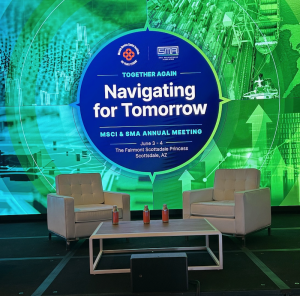Analysis
June 4, 2024
Final thoughts
Written by Ethan Bernard
When you step out of the airport in Phoenix in June, the heat tends to focus your mind. I was in town to attend the Steel Manufacturers Association/Metals Service Center Institute (MSCI) annual meeting in Scottsdale, Ariz., held June 3-4.

The gorgeous desert locale with palm trees, lush swimming pools, and the obligatory high-powered air conditioning was fitting for 2024. Between the presidential election and the geopolitical situation, things have definitely been heating up.
Presidential election
Courtroom drama with former President Trump may dominate the headlines, but steel is definitely an important component to this election.
“I think one of the things we see is an emphasis on steel this election cycle,” Philip K. Bell, SMA president, said at a press conference in Scottsdale on Monday.
One can look to both Presidents Biden and Trump opposing a U.S. Steel sale to Japan’s Nippon Steel, or the recent hiking of trade tariffs against China by the Biden administration.
Bell highlighted that steel is important for the candidates not only for political reasons, i.e., votes. “It’s very important for our country because of the economic security that we’re going to provide, as well as the sustainability issues that the steel industry is addressing,” he noted.
“I think one thing we want to make sure is that we have a more functioning government, a little less gridlock, and more cooperation,” he added.
MSCI President and CEO Bob Weidner emphasized that fair and free trade and pro-manufacturing policies, as well as “the whole regulatory environment,” needed to be addressed by both presumptive candidates.
“You know, I think both parties need to be held accountable, beyond rhetoric, for substantive dialogue and discourse,” he said.
He gave the example that the candidates need to truly be specific as to what their tax policy is relative to cap-ex, depreciation, and other tax elements crucial to industry.
“It is business that grows the economy,” he said, “and without industrial metals there is no life.”
World events
Like the election, from Ukraine to the Middle East, events have been worrying on the world stage. I asked how the steel industry should address the challenges, specifically the topic of reshoring supply chains.
“I think it comes down to a surety of supply,” MSCI Chairman John G. Reid said. He is also director, president, and CEO of Mississauga, Ontario-based metals distributor Russel Metals. With geopolitical tensions rising in multiple regions, shipping lanes could change in the blink of an eye, he said.
One area, of course, where this is already happening is in the Red Sea. There Houthi rebels off the coast of Yemen have threatened shipping, and there have been skirmishes with the US Navy.
“Your sourcing can change overnight,” Reid said. “What was once a three-week lead time can become a three-month lead time.” Therefore, he stressed the importance of bringing supply chains back to North America.
Beyond 2024
Bell ended the press conference on an upbeat note.
“We have to realize that between now and 2026, members of SMA are going to invest about $20 billion to build new capacity,” he said.
Bell added that new capacity is going to lead to the “modernization, the electrification, and the decarbonization of our steel industries.”
Ultimately, he said, it will allow for the production of lower-carbon-emission domestic steel.
Whatever happens in the election, Bell said “policy consistency and continuity” were paramount. As an example of that, he offered President Biden maintaining former President Trump’s Section 232 steel tariffs.
“We need to have policies in place that allow these investments to come to fruition and complete globally with anybody in the world. And I am actually pretty optimistic about that,” Bell said.






